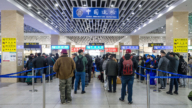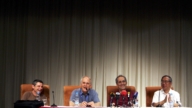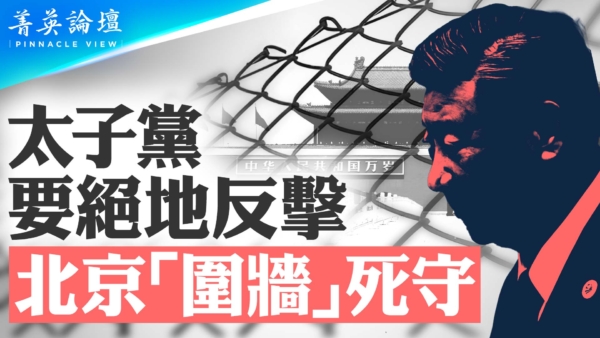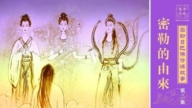【新唐人2013年02月04日訊】當今中國社會的怨氣為甚麼特別大?著名經濟學家茅于軾新書《中國人的焦慮從哪裏來》,以一個經濟學家的角度,對中國當前面臨的各種問題進行理性的分析,用鮮活的案例與經濟資料,反映當下中國人的精神狀態與生活現狀。
中國經濟學家茅于軾最近出版的新書提到,大陸雖然取得經濟發展,民怨卻特別深。
中國經濟學家茅于軾:「這本書不是我一次寫成的,是斷斷續續的一些文章收集在一起,實際上就是中國正處於一個轉型的社會,有很多問題需要討論的,我就發表我的看法吧。」
茅于軾提出幾個大家關注的問題,第一,問國家:要改革還是要建設?以人為本還是以國為本?第二,問社會:如何看待社會不公,怎樣獲得公平?富人的良心哪裏去了?第三,問民生:為甚麼我們住不上廉租房?為甚麼城管、保安經常打人?茅于軾認為,主因是「社會正義的缺失」,正義缺失簡單講,就是「不講理」。
茅于軾:「簡單說,孫中山推翻了滿清,中國的帝制和皇權好像是被清算了,實際上這個東西是死而不殭,一直是反反覆覆的出現,到毛澤東乾脆也變成秦始皇了。」
茅于軾《中國人的焦慮從哪裏來》全書從「正視社會不公」談起,對中國當前面臨的各種問題進行理性的分析,用案例與數據自答,剖析當下中國人的精神狀態與生活現狀。茅于軾呼籲中共「放棄私利,恢復講理,這是解決民怨的唯一道路。」
美國「南卡羅萊納大學艾肯商學院」教授謝田認為,中共自始自終不會放棄手中的權力。
美國南卡羅萊納大學艾肯商學院教授謝田:「中共從建政開始,他在大同社會、共產主義,這些虛假的謊言,把財富集中他手上之後,從來沒有放下他的私利。這種情況下,要鎮壓民眾的抗暴也好,或者是維持他的暴力統治也好,這些都是需要錢,所以要他放下私利的話,實際上基本上等於放下他們自己的權力,放下自己的權力,中共會馬上就會解體。」
謝田表示,中國人民對中共不僅是焦慮和怨氣,而是一種憤怒。
謝田:「越來越多的中國人,越來越認識到中共的本質,和中共犯下的罪刑,中共在這60多年來,殺害了七千萬、八千萬的中國民眾,雖然這些事實被披露出來之後,中共的本性被揭示出來,到今天的活摘器官也被國際社會所正視所關注。」
另外,茅于軾的新書還提到,大陸每年有成千上萬「民告官」的訴訟,但勝訴不到10%,某些地方政府還抓上訪求訴正義的人,「關他們、打他們」,打壓幫助百姓維權的律師,讓百姓伸張正義道路非常艱難,社會陷入正義無望,於是民怨迭起,百姓不再信任政府。
茅于軾新書內容表示,通常,百姓是沒有武裝的,他們只能靠講理來生存。如果他們的生存受到威脅,講理又講不通,國家就不穩了。而,社會有紛爭的時候,通過談判不見得總能達成協議,所以最後必須有不動武的解決辦法,那就是通過全民投票解決問題。比如決定國家領導人,如果兩派相持不下,就由投票解決,那就是民主憲政制度。「有了這樣一套規矩,社會就能講理,就一定能穩定,民怨也就沒有了。」
茅于軾 2012年3月,獲得米爾頓.弗裡德曼自由獎。1975年開始,從事微觀經濟學研究。1986年在美國哈佛大學擔任訪問學者,1987年回中國,此後7年內擔任非洲能源政策研究網顧問﹔1993年從中國社科院退休,參與創辦「北京天則經濟研究所」。
採訪/陳漢 編輯/黃億美 後製/王明宇
Mao Yushi’s New Book:
Where does the Chinese People’s Discontent Come From?
Why is there such great social discontent in China?
Mao Yunshi, a well-known economist, just published a new
book “Where does Chinese People’s Anxiety Come From”.
In this book, he objectively analyzes all kinds of issues that
China is facing from an economic point of view.
He utilized real cases and economic analyses to reflect
Chinese people’s current spiritual and living situation.
Mao Yunshi, Chinese economist,
recently publicized his new book,
in which he says that people’s discontent
has been escalating as fast as China’s economy.
Mao Yunshi: “My new book wasn’t completed all at once.
The articles in this book were collected over time.
China is at the stage of a society in transformation.
A lot of issues need to be discussed,
so I am only expressing my own opinion.”
Mao Yunshi raised a couple of questions that
people most care about.
The first one was addressed to the country:
Should reform or continued construction be applied?
Should the country be people-oriented or nation-oriented?
The second question was addressed to society:
how to deal with society’s injustices and how to acquire justice?
Where is the conscience of the wealthy?
The third question was addressed to people’s livelihoods:
Why can’t we rent cheaper? Why do city police and safety guards often beat ordinary people?
Mao Yunshi thinks that all of these problems are caused by
the loss of society’s sense of justice.
Mao Yunshi: “Simply speaking, Sun Zhongshan
overturned the Qing Dynasty.
It seems that the imperial system and imperial power
were eliminated from China.
In fact, the imperial system has never died out.
It comes back and forth. Even Mao Zedong
declared himself “First Emperor of Qin”.”
The book “Where does Chinese people’s anxiety come from”
begins with a discussion of “Facing up to Social Injustice”.
He objectively analyzed all kind of issues that
China is facing right now.
The analysis is backed up with real cases and numbers.
The book also summarizes Chinese people’s
current spiritual and living conditions.
Mao Yushi has asked the Chinese Communist Party
to give up self-interest and resume justice, this is the only way to solve social discontent.
Xie Tian, Professor from Business School,
University of South Carolina Aiken, stated that
the CCP has never planned to give up their power.
Xie Tian: “Since the CCP was founded, communism
has been used as a tool to collect wealth from people.
Self-interest is always the CCP’s only goal.
In order to crack down on its people’s resistance,
or to maintain its totalitarian regime, money is needed.
Therefore, if they let go their self-interest, they are
letting go their power. Once they lose their power, the CCP will disintegrate immediately.”
Xie Tian also stated that what Chinese people have now
is not only anxiety or discontent, but anger.
Xie Tian: “More and more Chinese people see the essence
of the CCP and the crimes that the CCP has committed.
In the past 60 years, the CCP has killed 7,0 or 8,0 million
Chinese people.
Now these facts are disclosed and
the essence of the CCP is exposed.
The crime, live organ harvesting, committed by the CCP
is also getting more and more international attention.”
In his new book, Mao Yunshi also mentions that
there are hundreds of thousands of petitions in which
ordinary people accuse of officials.
However, the success rate of those petitions is less than 10%.
Some local governments arrest those who appeal for justice,
then imprison them or beat them.
Mao Yunshi says in his new book that ordinary people
don’t have any weapons and they can only address the injustice by reasoning things out.
However, when their lives are endangered there
is nowhere they can address their reasoning.
In this case, there is no way that the country can be stable.
When there is any controversy, negotiation doesn’t
necessarily solve the disagreement.
In this situation, there has to be some way to solve it
without using force, this is a free vote for all of the people.
For example, when two factions cannot agree on
the candidates of nation’s senior leadership,
voting should be used to solve the disagreement.
This is a Democratic constitutional system.
“Once this set of rules is set up,
society will be able to reason things out.
Society will thus become stable.
People’s discontent will disappear too.”
In February 2012, Mao Yunshi was awarded
the Milton Friedman Prize.
Since 1975, Mao has been working on
the study of micro- economics.
In 1986, he stayed at Harvard University
as a visiting scholar. He went back to China in 1987.
Since then, he has served as a consultant for research
on African energy policies for 7 years.
In 1993, he retired from the Chinese Academy of
Social Sciences and helped found “Beijing Tianze Economic Research Institute”.































